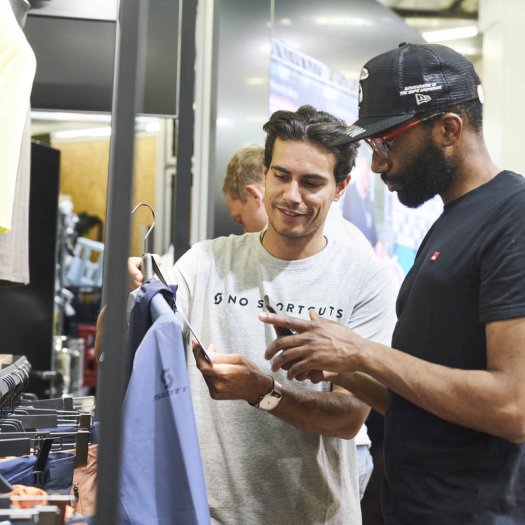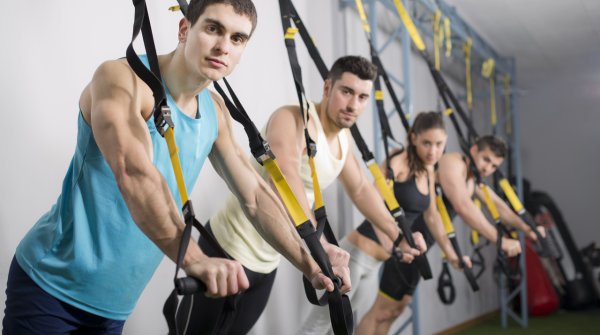- Showcase Your Sports Passion
- Emphasize Your Professional Expertise
- Demonstrate Your Sports Commitment
- Emphasize Professional Experience
- Highlight Your Sports Experiences
- Leveraging Team Sports as a Personal Advantage
- Team Captains Demonstrate Leadership Qualities
- Selling Weaknesses as Strengths
- Lone Wolf in Sports - Professional Winner Type?
- Score with Language Skills

Expressing your enthusiasm for sports in your application is crucial. To maximize your success and highlight your passion in your application, try to directly connect it with your job profile. Share your own interests and achievements, such as participating in a marathon or volunteering as a coach for youth teams. This makes the application potentially much more appealing to the company. This not only increases your chances but also facilitates finding topics for the interview and enhances likability.
By doing so, you not only demonstrate your love for sports but also show potential employers how your passion can translate into valuable contributions to their organization. Mention any sports-related achievements or ongoing involvement, such as participating in local leagues or organizing community sports events, to further illustrate your dedication.
➡️ Popular Job: Sports Marketing Specialist
People in this role create and execute different strategies to boost the visibility and success of sports teams, products, or events. They design and run advertising campaigns, negotiate sponsorship deals, and manage public relations efforts to enhance reach and increase profits.

Graduates with sports-related degrees are well-suited for advanced roles because of their deep knowledge in sports science, management, and psychology. Meanwhile, those with degrees in business administration or design should highlight how their skills, such as strategic planning and marketing, are relevant and valuable in the sports industry. Professional athletes can leverage their firsthand experience and achievements to transition into sports business roles, showcasing their deep understanding of the sport.This blend of specialized education and practical experience makes them valuable candidates for various roles within the sports industry.
➡️ Popular Job: Sports Manager
Sports managers take care of the business aspects of sports teams, organizations, or clubs. They handle various responsibilities such as managing promotions and marketing efforts, overseeing financial matters, and making decisions related to staffing.
Showcasing your involvement in sports activities can significantly impress employers, even if these activities go beyond the job requirements. Highlighting your participation in sports-related projects demonstrates your dedication and long-term commitment to the industry. Mention any planned projects, such as a thesis focused on sports topics, upcoming competitions, or involvement in organizing sports events.
If you have no experience whatsoever, huge sporting events close to you can be a great opportunity to get things moving. For example, at the Paris Olympic Games 2024 there was a huge search for volunteers. Events like this offer a unique chance to gain professional experience and insights into the operations of such a large event. You get the chance to enhance your professional skills, also they offer a unique perspective on organizing one of the world's largest sporting events.
These examples provide concrete evidence of your passion and proactive approach to staying engaged in the sports world. This not only reinforces your suitability for the role but also illustrates your continuous enthusiasm and commitment to the sports industry.
➡️ Popular Job: Sport Sales
Sport sales involves marketing and selling sports-related products and services, such as athletic equipment, apparel, event tickets, and sponsorships, to drive revenue for organizations.
One of the most important aspects, in addition to a general interest in sports, is internships in this field. They are possibly the only way to gain practical experience, without which one cannot even come close to understanding the internal workings of the sports industry, and relevant skills can also be developed. Whether you prefer to work in sports management, marketing, or event coordination, internships offer a practical introduction that can create a strong foundation for your future career.
In addition to internships, temporary jobs at sports events can also be useful to significantly improve your application and knowledge. Even relatively simple jobs like assisting at marathons, managing logistics for local sports tournaments, or volunteering at large-scale sporting events demonstrate a higher level of industry interest compared to other applicants. These positions show your willingness to gain experience and contribute to the sports world, reinforcing your dedication to potential employers.
By participating in the volunteer programs, for example, as mentioned above, the Olympic Games in Paris, you can gain valuable practical experience that will elevate you both personally and professionally.
The best option, of course, would be a combination of both activities. This way, you will have a diverse portfolio of experiences that other applicants may lack. In addition to the experiences, this also shows potential employers that you are proactive, committed, and passionate about the topic and have been engaged with your career in the sports industry over an extended period.
➡️ Popular Job: Event Coordinator
Event coordinators plan and organize sports events, from local competitions to international tournaments. They manage logistics, coordinate with vendors, and ensure events run smoothly.
If you couldn’t meet the points mentioned earlier for various reasons, you can still use your sports hobbies to show your soft skills. Your involvement in sports can highlight important qualities like motivation, dedication, perseverance, and ambition.
Whether you play team sports or individual sports, you learn important skills for work. Team sports like soccer teach you to work well with others, communicate clearly, and handle criticism. Individual sports like tennis or swimming focus on self-motivation, discipline, and reaching personal goals. These skills are important in jobs because they show you work hard and want to succeed.
By highlighting your experiences and the skills you’ve gained, you can show that you’re a versatile candidate with genuine enthusiasm and strong people skills. This can help cover any lack of direct work experience and demonstrate why you’d be a great asset to any team.
➡️ Popular Job: Sports Agent
Sports agents represent athletes in handling contracts, negotiating endorsements, and managing business matters. They make sure their clients get fair pay and help guide their careers effective.
Experience in team sports provides a foundation for essential social skills that are indispensable for a career, especially in the sports sector. This participation not only underscores the importance of sportsmanship but also of teamwork, as success often depends on the combination of efforts.
Participation alone fosters empathy, as it teaches one to handle the needs and emotions of others. These skills are highly valuable in the workplace, as supportive and understanding relationships are essential for fostering team morale.
Communication skills, as well as the ability to handle criticism and conflicts, are enhanced through these activities, which are crucial for receiving and acceptingfeedback. This development allows for the improvement of personal skills, the articulation of ideas, and the persuasive conveyance of messages.
➡️ Popular Job: Sports Therapist
A sports therapist specializes in preventing, diagnosing, and treating sports-related injuries, using techniques like manual therapy and rehabilitation programs to enhance recovery and performance. They work closely with athletes to develop injury prevention strategies and ensure a safe return to activity.

Leading a sports team shows your skills in leadership and team management. As a team captain or coach, you guide your team, create strategies, and promote teamwork. This role needs a good understanding of the sport, plus the ability to inspire and motivate your team, handle conflicts, and make important decisions under pressure. These experiences are very valuable and can easily be used in professional environments where strong leadership and good decision-making are important.
Taking on voluntary leadership roles in sports also shows confidence, ambition, and good communication skills. Volunteering to lead, whether it's organizing sports events, leading a community sports league, or mentoring young athletes, shows your proactive nature and willingness to take responsibility. These roles require you to communicate well with different groups, negotiate and solve problems, and manage resources efficiently.
Handling criticism and resolving conflicts are other important skills you gain from team sports. Dealing with feedback and disputes is a natural part of any team environment. Through sports, you learn to handle criticism positively, address conflicts calmly, and stay positive under pressure. These skills are directly useful in professional environments where managing relationships and keeping a cooperative atmosphere are essential.
➡️ Popular Jobs: Community Sports Organizer
Leading community sports programs, mentoring young athletes, and promoting community engagement.
When trying to explain gaps in your resume, it's important to frame them as positively as possible, showing growth and resilience. If you took a break to shift your career towards sports, highlight how this time shows your adaptability, determination, and ability to handle setbacks constructively.
Firstly, discuss the proactive steps you took during this time. Whether you pursued additional training, obtained relevant certifications, or engaged in volunteer work within the sports industry, highlight these efforts to show your commitment to personal and professional development. This approach not only fills the gap but also showcases your continuous drive to improve and stay engaged.
Moreover, explain how this break allowed you to gain new perspectives and skills that are beneficial to your desired role. For instance, if you used the time to coach a local sports team or organize community sports events, outline how these experiences enhanced your leadership, project management, and communication abilities. Such activities demonstrate that you were not idle but actively building relevant competencies.
Additionally, present the gap in your career as a conscious choice to align with your passions and long-term goals. This shows your self-awareness and commitment to finding a fulfilling career, qualities that employers really value. It demonstrates your willingness to take thoughtful risks to achieve your goals, reflecting both resilience and a proactive attitude.
➡️ Popular Job: Sports Data Analyst
Analyzes performance data and statistics to provide insights for improving team strategies and player performance.

Participating in individual sports like marathons shows self-motivation, endurance, and independence. These activities require dedication and the ability to achieve long-term goals. These traits are highly valued in the professional world because they demonstrate self-reliance and initiative.
However, it's also important to show teamwork skills. In most jobs, collaboration is crucial. So, complement your individual achievements with examples from team environments. Highlight experiences where you communicated and coordinated successfully with others, such as in team sports or group projects.Balancing individual and team experiences shows a versatile skill set. Employers appreciate candidates who can work independently and thrive in a team setting.
➡️ Popular Job: Sports Psychologist
Helping athletes with mental preparation, stress management, and performance enhancement.
In the global sports industry, intercultural skills are key for effective communication and teamwork. Highlight your language skills, especially in English, and a cosmopolitan attitude to stand out to employers.
Being fluent in multiple languages shows you can connect with various people, including international clients and diverse team members. Share how your language skills have helped in past roles, such as improving interactions or negotiations.
A cosmopolitan attitude means being open to different cultures and adapting to global perspectives. Mention any international experiences, like studying abroad or working with multinational teams, that have enhanced your intercultural skills.
If you have an immigrant background, use your unique perspectives and multilingual abilities. Show how your multicultural experiences have deepened your understanding of cultural nuances and improved your ability to navigate diverse environments.
➡️ Popular Job: Sports Communications Manager
People like this work in public relations and media management for sports organizations, coordinating international press conferences and interviews.

ISPO gives you the chance to explore a variety of information stands on the latest trends in the sports industry and make valuable connections. Take the opportunity to learnabout different career paths, speak with industry experts, and expand your professional opportunities. Visit ISPO to elevate your career in the sports sector.
- Sports Physician
Average Salary: $199,162 - Director of Sports Marketing
Average Salary: $145,112 - Marketing Manager
Average Salary: $135,900 - Sales Manager
Average Salary: $126,640 - Sports Agent
Average Salary: $110,000 - Facilities Manager
Average Salary: $98,430 - Administrative Services Manager
Average Salary: $96,940 - Sports Psychologist
Average Salary: $73,953 - Sports Accountant
Average Salary: $71,550 - Broadcasters and Analysts
Average Salary for Sports Broadcaster: $57,770

 Sports BusinessSki Mountaineering Goes Olympic: What Milano-Cortina 2026 Means
Sports BusinessSki Mountaineering Goes Olympic: What Milano-Cortina 2026 Means
- ISPO awards
- Mountain sports
- Bike
- Design
- Retail
- Fitness
- Health
- ISPO Job Market
- ISPO Munich
- ISPO Shanghai
- Running
- Brands
- Sustainability
- Olympia
- OutDoor
- Promotion
- Sports Business
- ISPO Textrends
- Triathlon
- Water sports
- Winter sports
- eSports
- SportsTech
- OutDoor by ISPO
- Heroes
- Transformation
- Sport Fashion
- Urban Culture
- Challenges of a CEO
- Trade fairs
- Sports
- Find the Balance
- Product reviews
- Newsletter Exclusive Area
- Magazine




